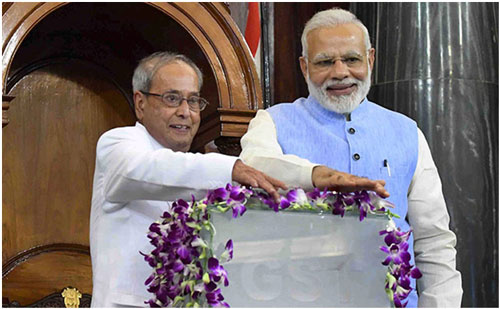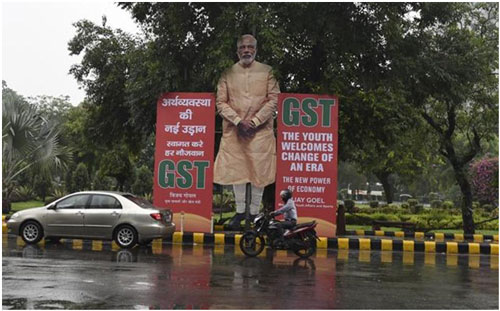 Goods and services tax has suddenly become a bad idea in the parlance of the Opposition and its ally economists. It is being described as a step taken in haste. The government is being accused of not taking proper account of the difficulties that are being encountered by the businesses; especially the smaller and the medium sized ones in India.
Goods and services tax has suddenly become a bad idea in the parlance of the Opposition and its ally economists. It is being described as a step taken in haste. The government is being accused of not taking proper account of the difficulties that are being encountered by the businesses; especially the smaller and the medium sized ones in India.
The critics point out the complexity of the procedures and rules along with the declining fortunes of that sector. The small and medium enterprises are suffering, it is being asserted, on account of business to business transactions. Furthermore, the implementation of the GST has been undertaken without putting proper instruments in place. For example, the SMEs and the larger players as well find that the Goods and services tax network hardly responds to the load of transactions and allows only a limited number of returns toward the end of the set deadline. There is a collapse of the system. In addition the exporters are uneasy because there is blockage of funds.
On the issue of hasty decision and implementation, it would be pertinent to mention that the matter was coveted for almost a decade. Even the present day critics of the reform were very keen to enact this law. UPA tried, though did not succeed. Ten years is not a period small enough to discuss, deliberate and decide upon a policy. Even the BJP led NDA carried it forward through consultation, persuasion and interactions between the centre and the states. It was only after both the partners in decision making reached a consensus that a law to effect common goods and Services Tax was introduced and passed with hardly any dissent.

So far as the date of implementation is concerned, it may be a matter of contention. Should the law have been implemented after a year or two of adequate preparation or should have been executed from the date it is being handed over to the nation to accept and administer. It can be easily argued both ways. However, looking at the importance of the tax reform, evident from the congruence of approach to the matter between the political parties of both the ruling and the opposition benches, delaying the implementation might have diluted the capability and capacity of the reform to produce the desired results for the economy as a whole.
The unpredictable politics and the lobbies of different kinds might have been able to derail the process of change. Therefore, it is more prudent to execute the decision immediately than to postpone it for a later date.
As for the difficulties or hardships of the SMEs, even though there is no concrete data in that regard, a concession has to be given to the measure of reform. There is what is called a gestation period for many investments before profits or returns on that investment can be expected to reach the investor. This measure is also such policy investment that would after the passage of the gestation period would not only make the tax administration easy, it would benefit the entire society-The consumer, the tax payer and the producer and trader as well. In the short run, there could be some labour pains. But there is no escape from them to give birth to a new life in the world. This new life brings happiness to not only the parents but to the family and the neighbours too. At the same time, the government cannot and should not abdicate its role as a facilitator to a smooth delivery but also a safe delivery. It must ensure that the delivery is as painless as possible and the risks of losing are reduced to the minimum. There could be occasions when caesarian delivery is not welcome, even it may be resisted, but ultimately it is the discretion of the doctor.

It may be taken that the SMEs are facing the labour pain, it is meant to benefit them too finally in the long run. It would further prove a milestone in the fight of India against black money and the tax evasion. There is quite a big number of supporters of this theory in the country and treat the criticism as motivated than real. The contention is that the debate is being carried forward more by those who were beneficiaries of the earlier tax system where in they hardly maintained any account of their transactions in a transparent tax compliant manner. It would be difficult, if not impossible, to evade tax under this GST regime.
Otherwise, the GST council is responsive and flexible enough to accommodate the demands of the change under GST. Rules and rates are continuously under review accordingly. Even here the government is subjected to criticism when it is accused of frequently changing them, thereby causing confusion and uncertainty among those who are to carry out the new rules and IT systems. It can be asserted here that the system would have to adjust to what emerges after the experience of the outcomes of the system.
In the end, it would not be out of place to aver that it is too early to judge the efficacy of the tax reform in the form of GST. The opposition, the industry, business and trade in the country as well as the government shall have to join hands to make the system of GST work to success. The honest shall have to become more vocal in supporting the measure if he thinks that opposition is unfounded or being governed by the political motivations or for hiding dishonest goals to create and nurture black parallel economy. At the same time the government shall have to address the genuine grievances of the stakeholders.
(The writer is senior consultant, School of Social Sciences, IGNOU, New Delhi)